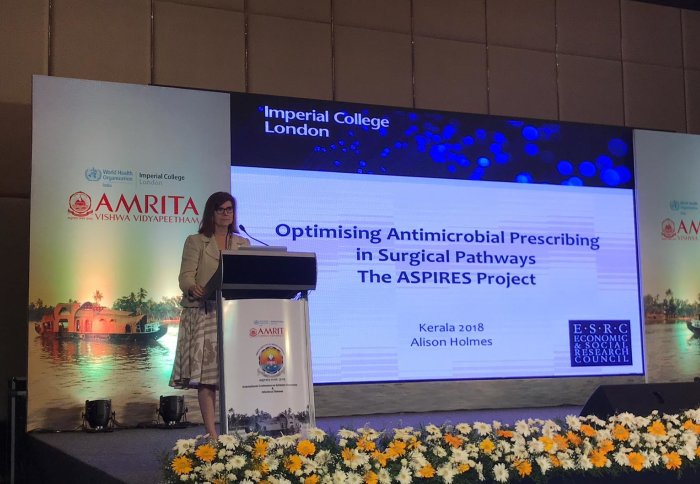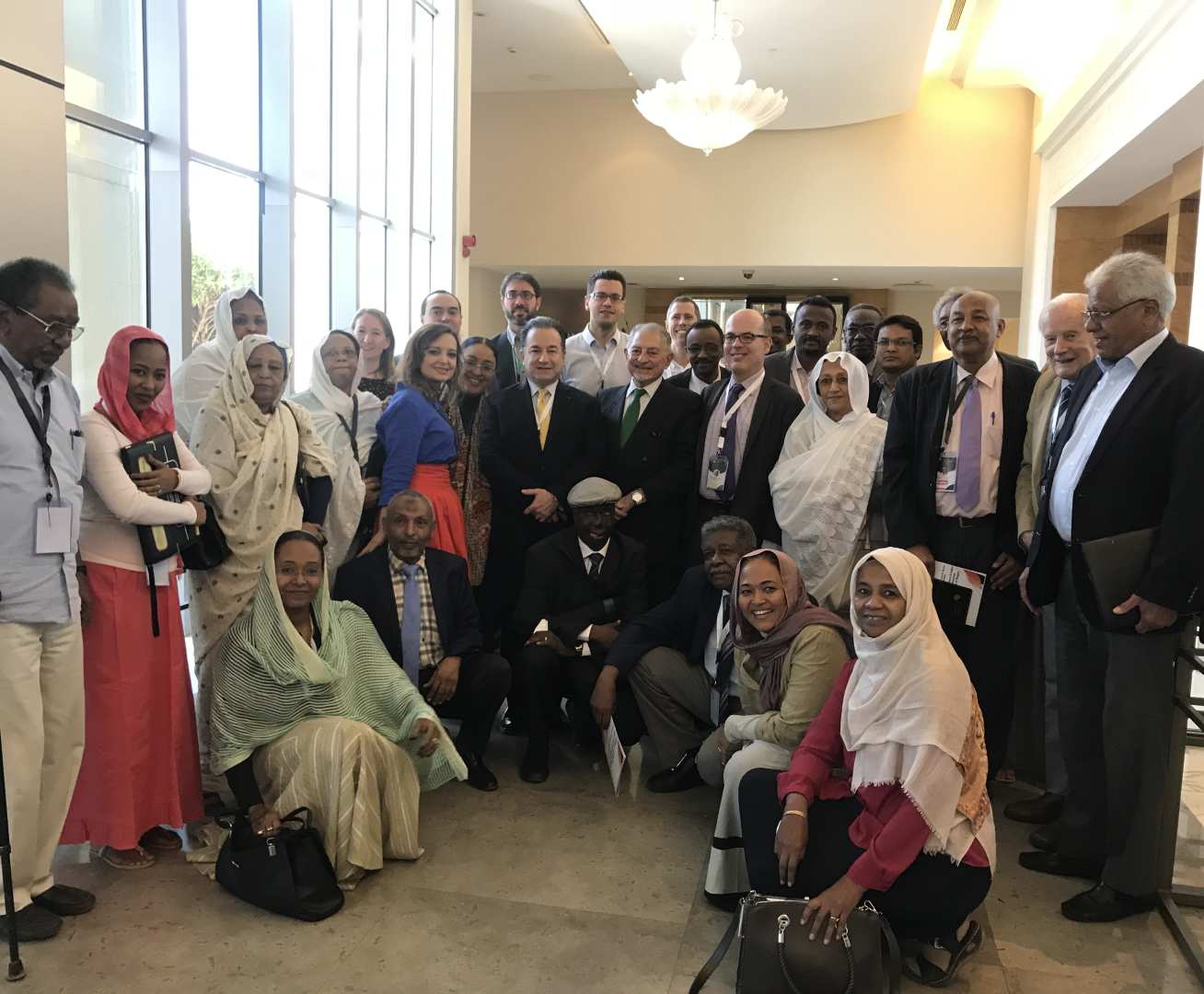A global agenda to tackle antimicrobial resistance

Professor Alison Holmes presenting in Kerala
Professor Holmes attended a number of high profile meetings in October and November that focused on tackling the threat of antimicrobial resistance
October and November has seen Professor Alison Holmes attending some high profile and important meetings in her capacity as the Director of the HPRU, Professor of Infectious Diseases and PI for important Grants. As the Principal Investigator of the multimillion pound ESRC funded project ASPIRES (“Optimising antibiotic use along surgical pathways: addressing antimicrobial resistance and improving clinical outcomes”) she headed up the first international symposium in India, Kerala. The aim of the symposium was to continue to build collaborative networks and capacity to optimise infection related outcomes in surgical pathways with collaborators from India, South Africa, Rwanda and other UK based partners. It was co-organised by Imperial and Amrita Institute of Medical Sciences and focused on how the ASPIRES project fits with the global agenda for addressing AMR. The ASPIRES meetings coincided with Kerala’s launch of a state-level action plan for containing AMR and a two-day International Conference on Antibiotic Stewardship and Infectious Diseases “No action today, no cure tomorrow”, where Professor Holmes amongst other members of the NIHR HPRU presented. Members of ASPIRES also had the opportunity to have a round table meeting with the State Chief Secretary for Health, Dr Arjun Srinivasan.
After India, next stop was Annecy, the alpine town in southeastern France, where Professor Holmes presented the research findings and results of the “Real-time Enhanced Antimicrobial ConTroller (IC-REACT) “ project, funded by the Merieux Foundation, followed by two days as the International Director for the “Rational Use of Antibiotics and Antimicrobial Stewardship Programs” in Amman, Jordan. The event was organised under the Patronage of His Excellency Minister of Health of Jordan and was aimed to share developments about the nature and sources of AMR, highlight the role of national surveillance on AMR and antibiotic use, provide a solid background on rational use of antibiotics, emphasize the role of management guidelines and to introduce and promote the concept of stewardship programs as a viable intervention to curb AMR and explore the role of conventional and novel diagnostic and therapeutic techniques to confront AMR.
Professor Holmes was also invited to speak at a 2 day conference Rational Use of Antibiotics and Antimicrobial Stewardship in Amman, Jordan. At the event Prof Holmes gave presentations on the “Global trends in AMR”, “Innovation and applied research to optimize prescribing” and “Organizational approaches to support and deliver Antimicrobial Stewardship”. Colleeagues Professor Paul Aylin and Dr Esmita Charani were also present at the conference and delivered talks.
Professor Holmes, in her capacity as the chair for the Technical Advisory Board for the Fleming Fund, has also attended the Fleming Fund Delivery Partners Event 2018 in Dar Es Salaam, Tanzania. The event was hosted by the British High Commission in partnership with the UK Department of Health and Social Care. The event was focused on the learnings of grant support in Africa and introducing the new AMR reference centre, discussing how it will contribute to the One-Health approach on AMR. The event was followed by a day of meetings for the Technical Advisory Board.
The last stop on the intense month of travelling internationally to spread the word about the importance of AMR as well as forming new collaborations, was Accra, Ghana. Prof Holmes was attending as a member of the Advisory Board of the Wellcome-Surveillance & Epidemiology of Drug-resistant Infections Consortium (SEDRIC). Apart from the board meeting, she also took part in the two day conference entitled “Call To Action on Antimicrobial Resistance (AMR)”. The event was sponsored and hosted by the Government of the Republic of Ghana along with the governments of Thailand and the United Kingdom, the World Bank, the UN Foundation and the Wellcome Trust. The second Call to Action event was be held at the Kempinski Hotel Gold Coast City in Accra, Ghana on the 19th and 20th November 2018. The event drew together the range of existing work to tackle AMR across national governments, multilateral institutions, civil society, private sector and experts and focus on the most critical gaps in anti-microbial resistance

Dr Charani, represented the multidisciplinary research group led by Prof Alison Holmes, and shared ongoing research in Antimicrobial Resistance.
Imperial College London together with the University of Khartoum and the Ahfad University for Women held a three day conference in Khartoum, Sudan November 20 – 23 to address the burden of disease in Sudan and encourage greater scientific collaboration between the institutions. The faculty from Imperial included, Prof Nadey Hakim (President's Envoy, Adjunct Professor) and Dr Alex Miras (Clinical Senior Lecturer, Department of Medicine), Prof Simon Taylor Robinson (Professor of Translational Medicine, Department of Surgery & Cancer), Dr Esmita Charani and Dr Aubrey Cunningham from Department of Infectious Diseases. The Imperial Department of Engineering was represented by Prof Mike Templeton and Dr Wouter Buytaert, who presented the ongoing research on water, sanitation and Schistosomiasis. The Imperial visitors highlighted the opportunities for collaboration in key areas, including tackling antimicrobial resistance, research in malaria and surgery and diabetes. The aims of the meeting were to:
- Define complimentary research priorities in Sudan and UK.
- Outline potential partnership opportunities and challenges between Sudanese and UK institutions.
- Encourage peer learning and exchange of research ideas.
- Describe how future partnerships might work and how they might be funded and sustained.
- Encourage capacity building focusing on training of technical staff, developing soft and pedagogical skills and engage with young researchers to obtain MSc and PhD degrees.
The visit also afforded the opportunity for site visits to laboratories and hospitals within University of Khartoum and Ahfad University, providing rich experience for networking and generating new ideas for collaboration and research to enable bi-directional learning.
Article text (excluding photos or graphics) © Imperial College London.
Photos and graphics subject to third party copyright used with permission or © Imperial College London.
Reporter
Anna Skordai
Department of Infectious Disease
Rakhee Parmar
Department of Infectious Disease